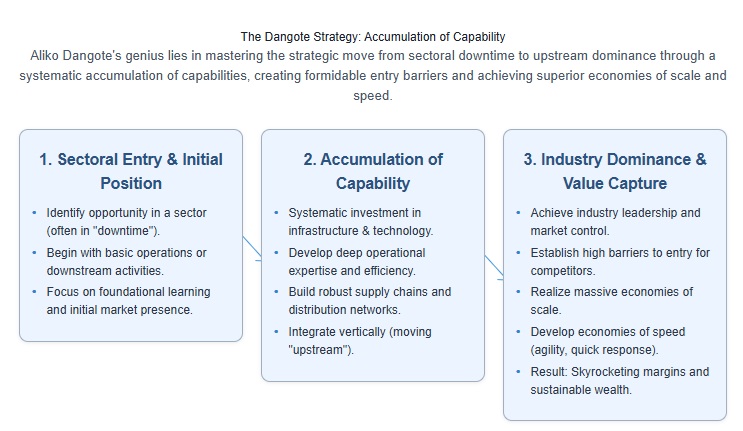
Question: “What is the accumulation of capabilities according to Ndubuisi Ekekwe in tekedia?”
Response: According to Ndubuisi Ekekwe, as frequently discussed on Tekedia, the accumulation of capabilities is a fundamental principle for companies to succeed and address market frictions. He emphasizes that companies are established to solve problems or “frictions” in the market, and to do so, they must acquire and accumulate specific capabilities.
These capabilities are built upon three key pillars:
Register for Tekedia Mini-MBA edition 19 (Feb 9 – May 2, 2026).
Register for Tekedia AI in Business Masterclass.
Join Tekedia Capital Syndicate and co-invest in great global startups.
Register for Tekedia AI Lab.
Tools: This refers to the technologies, software, machinery, and other physical or digital resources that a company utilizes to operate and produce.
Processes: These are the established methods, procedures, and workflows that a company implements to organize its operations, ensure efficiency, and deliver consistent results.
People: This encompasses the human talent, skills, knowledge, and expertise within the organization. Skilled and knowledgeable individuals are crucial for effectively utilizing tools and executing processes.
Ekekwe posits that these three pillars—tools, processes, and people—are then used to organize and reorganize factors of production. This organization allows companies to create the products and services that are ultimately deployed in the market to solve customer frictions and generate value.
In essence, for Ekekwe, the accumulation of capabilities is about building a robust and adaptable internal engine (comprising the right tools, efficient processes, and skilled people) that enables a company to innovate, produce, and effectively address the evolving needs of its target market.
In this video, I have used the Dangote Group as a case study. Next week, as I begin podcasting daily on the revelations on business, deeper insights would be shared.
According to Ndubuisi Ekekwe in Tekedia, the “accumulation of capability” construct refers to a strategic process where companies systematically develop and gather the necessary abilities, resources, and expertise to gain a competitive advantage and ultimately dominate their market.
Here’s a breakdown of what it entails:
- Fixing Market Frictions: Companies are established to address specific challenges or “frictions” within a market. To effectively resolve these, they must acquire and accumulate capabilities.
- Pillars of Capability: These capabilities are built upon three main pillars:
- Tools: The technologies, machinery, and systems utilized.
- Processes: The efficient and optimized workflows and operational methods.
- People: The skilled talent, expertise, and human capital.
- Organization and Reorganization: These three pillars (tools, processes, and people) are then organized and reorganized to effectively manage factors of production.
- Creating Products and Services: The culmination of these organized capabilities leads to the creation of superior products and services that effectively address customer frictions in the market.
- Strategic Outcome (Higher Value Segments): When companies successfully accumulate capabilities, they are able to operate in higher-value market segments compared to their competitors.
- Example (Dangote Group): Ekekwe often uses the Dangote Group as a prime example. Dangote leverages its accumulated assets and technical expertise (e.g., in cement production) to establish significant barriers to entry for new competitors. By continually perfecting its system, Dangote achieves higher productivity, economies of scale, and economies of speed, which in turn lead to skyrocketing margins and industry leadership.
In essence, it’s a dynamic process of continuous learning, investment, and strategic integration that allows a firm to not just compete, but to lead and extract maximum value from a sector.
---
Connect via my
LinkedIn |
Facebook |
X |
TikTok |
Instagram |
YouTube



